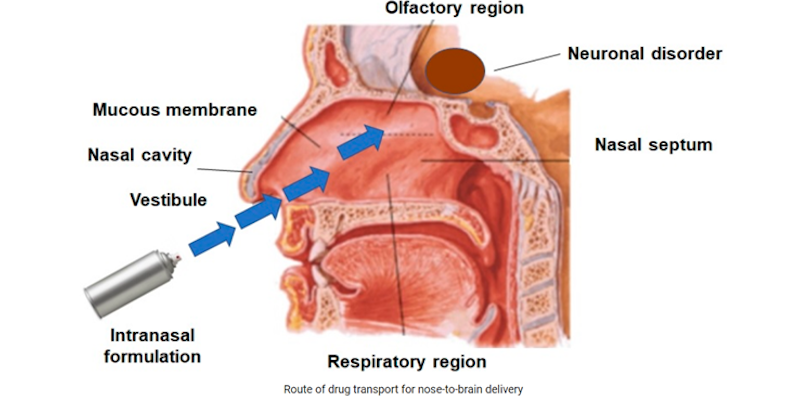Launch of the European project INDENEO

EVEON announces the launch of the European project INDENEO to develop an innovative delivery system for nose to brain administration of biological and advanced therapy drugs to neonates.
The Rare Disease Research Challenge Call, launched by the European Joint Programme for Rare Diseases and co-funded by the biopharmaceutical company Chiesi Group, aims to develop a dropper system from nose to brain for biological drugs and advanced therapies in neonates. For certain rare diseases involving the CNS, for example, neonatal encephalitis, intranasal delivery allows to target the central nervous system, thanks to the transfer from the nose to the brain of the molecules. Minimally invasive and restrictive, this is recognized as one of the most useful and reliable routes for brain drug absorption leading to quick drug action, with greater efficacy and reduced risk of infection.
INDENEO (INtraNasal Device for NEOnates) project brings together an international consortium of 4 partners. EVEON, project leader, brings its expertise in the development of delivery devices and its ability to deliver microdoses; Chiesi contributes with its expertise in pharmaceutical development and neonatology; Les Cliniques universitaires Saint Luc (Belgium) brings its top level clinical expertise and Infectious Disease Models and Innovative Therapies (IDMIT) department at the CEA (Fontenay aux Roses site - France) its expertise in carrying out pre-clinical trials.
INDENEO will last 18 months with two main milestones: the design and development of a functional prototype, then the pre-clinical validation.
«At EVEON, we are honored and excited to lead the INDENEO project and work together with Cliniques Saint Luc, CEA and Chiesi Laboratories for the development of a new device. Nose To Brain delivery will open up new ways to address major unmet medical needs for neonates neurological rare conditions. We are proud to work on this innovative project that is at the heart of our goals : developing automatic and controlled devices for allowing safe and efficient delivery of biological drugs.» said Claire Authesserre, Technical Pre-Sales Manager and Gladys Corrons-Bouis, Business Development Director, EVEON.
“As Chiesi Global Rare Diseases we are excited to contribute to such an important project to enhance the possibilities of successfully treating rare central nervous system (CNS) diseases in neonates. Our Company has a long history in the field of neonatology, which is combined here with our commitment to rare diseases - commented Diego Ardigò, Head of R&D Rare Disease Unit at Chiesi Group -. We truly believe in the power of collaboration in the advancement of scientific research, because by combining expertise and resources you can answer bigger and more complex scientific questions and generate greater value. We are also driven by our desire to bring new or improved treatments and services to people suffering from rare diseases and debilitating chronic conditions, always focusing on the often-unseen needs, where we can make the biggest difference. We are committed to giving our patients and their loved ones the support they need to lead more active and fulfilling lives”.
«Stem cells hold tremendous promise for regenerative medicine. Preclinical research suggest that stem cells may represent the next breakthrough in the repair of currently devastating brain injury in neonates, including stroke and hypoxic-ischemic lesions. Recent safety studies in human neonates have suggested that the nasal route may be the most efficient way to deliver stem cells in the neonatal brain. This exciting project will pave the way for a safe, effective, and painless administration of novel therapies for the neonatal brain » said Maria-Roberta Cilio, Cliniques universitaires Saint Luc.
«INDENEO is one of three projects selected for funding within the Rare Diseases Research (RDR) Challenges call led by the Foundation for Rare Diseases and EJP-RD. We are very excited about this innovative project fostering public-private partnerships to drive rare disease research towards effective treatments, which is at the very heart of this European funding initiative.» said Christine Fetro, Foundation for Rare Diseases.
«We are enthusiastic to contribute to this European consortium. The development of nasal drug delivery systems is an important challenge for many fields of medicine, beyond the rare pediatric diseases targeted by INDENEO. » said Roger Le Grand, executive director of IDMIT, CEA.
More details:
- Read the full Press Release: English | French
- Contact us
Image source - Pharma Excipients

